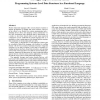Free Online Productivity Tools
i2Speak
i2Symbol
i2OCR
iTex2Img
iWeb2Print
iWeb2Shot
i2Type
iPdf2Split
iPdf2Merge
i2Bopomofo
i2Arabic
i2Style
i2Image
i2PDF
iLatex2Rtf
Sci2ools
121
click to vote
HASKELL
2006
ACM
2006
ACM
Strongly typed memory areas programming systems-level data structures in a functional language
Modern functional languages offer several attractive features to support development of reliable and secure software. However, in our efforts to use Haskell for systems programming tasks— including device driver and operating system construction—we have also encountered some significant gaps in functionality. As a result, we have been forced, either to code some non-trivial components in more traditional but unsafe languages like C or assembler, or else to adopt aspects of the foreign function interface that compromise on strong typing and type safety. In this paper, we describe how we have filled one of these gaps by extending a Haskell-like language with facilities for working directly with low-level, memory-based data structures. Using this extension, we are able to program a wide range of examples, including hardware interfaces, kernel data structures, and operating system APIs. Our design allows us to address concerns about representation, alignment, and placement (in virtu...
Related Content
| Added | 13 Jun 2010 |
| Updated | 13 Jun 2010 |
| Type | Conference |
| Year | 2006 |
| Where | HASKELL |
| Authors | Iavor S. Diatchki, Mark P. Jones |
Comments (0)

